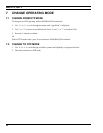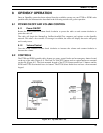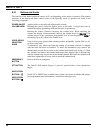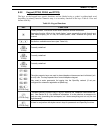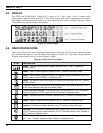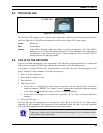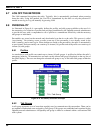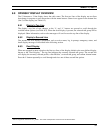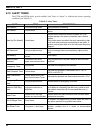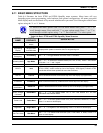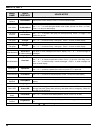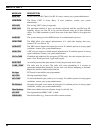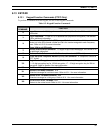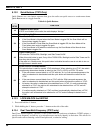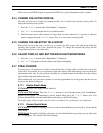
MM23772, Rev. F
32
8.10 ALERT TONES
The P7200 and P5200 radios provide audible Alert Tones or “beeps” to indicate the various operating
conditions (see Table 8-3).
Table 8-3: Alert Tones
NAME TONE DESCRIPTION
Call Queued
1 low tone/2 high tones Call queued for processing.
Call Denied
3 short beeps
Radio is out of coverage area or requested talk group is
active.
Grant (or Go-Ahead)
1 short beep
Sounds when resources become available for a call
request placed in the queue (if enabled) upon channel
access.
If the radio roams to another site while transmitting, then
it will auto rekey and begin transmitting on that tower. It
gives a second grant tone to let the user know they have
roamed.
Call Removed
1 long low-pitched tone
Notifies the user access to the channel has been lost
(out of coverage area or pre-empted by higher-priority
call).
Low Battery
1 low-pitched/one short mid-
pitched
Low battery.
Selective Alert
Received
1 short tone, two short
beeps, and one short tone
Only played once to indicate a selective alert has been
received.
Emergency Tone
3 long tones Indicates an emergency was declared.
Client Connect Tone
2 short beeps
Indicates the portable is connected to the V-TAC in
XCOV or XCOV-TG.
Client Disconnect
Tone
2 short beeps (lower-pitch
than Client Connect Tone)
Indicates the portable has disconnected from the V-TAC.
Emergency Cleared
Tone
1 long low-pitched tone Sounds when an emergency is cleared.
Selective Call Ring
Tone
ringing tone similar to a
telephone
Ringing is repeated every four (4) seconds until the call
is accepted or rejected by the radio being called or until
the network drops the call if unanswered after one (1)
minute.
Roam Tone
2 short tones, one high-
pitched and one low-pitched
Sounds when the radio transitions from one radio base
station site to another.
Out of Range Tone
3 brief tones
If enabled via programming, sounds when the radio is
not within operational range with base station.
Man Down Tone
1 long tone, 1 short beep
Indicates that the radio has assumed a horizontal
position, perhaps due to a threat or environmental
hazard.



